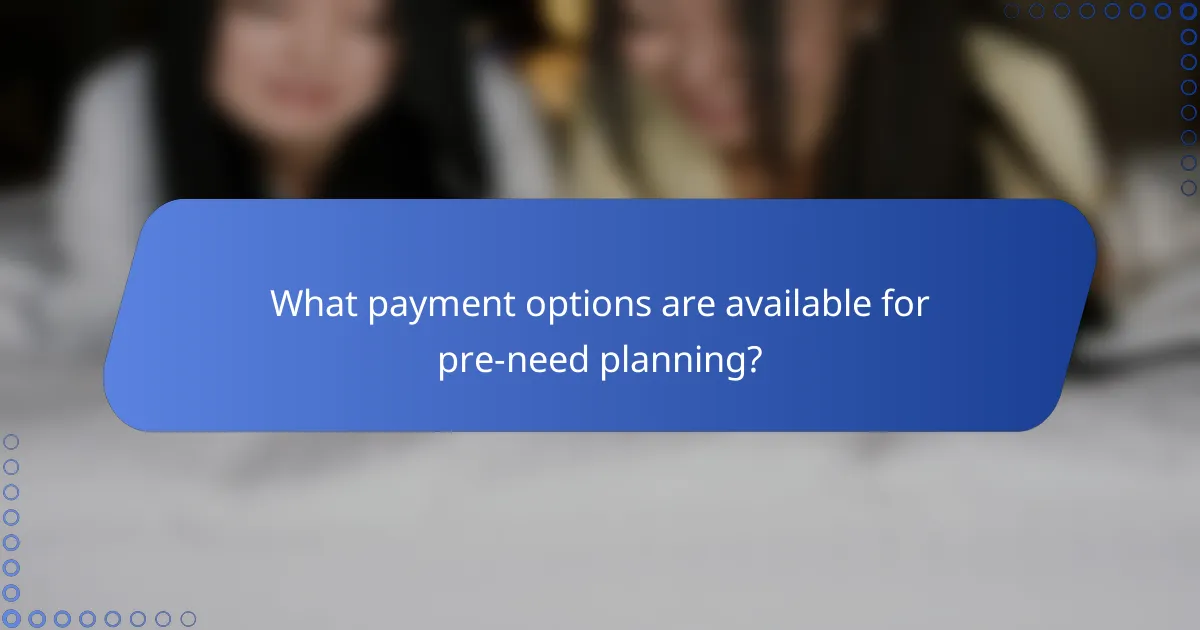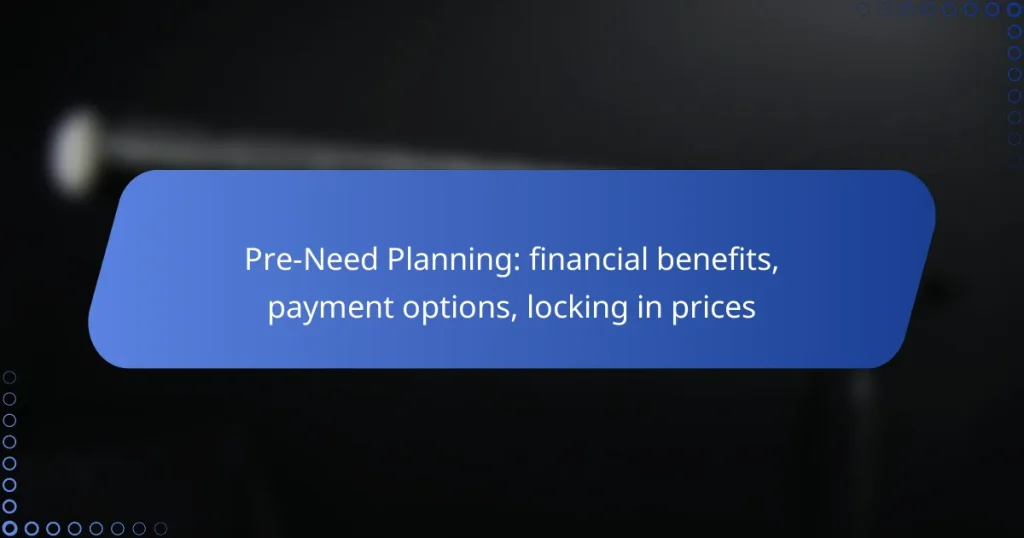Pre-need planning provides individuals and families with a proactive approach to managing future expenses, offering significant financial benefits such as cost savings and tax advantages. By locking in current prices for future services, you can protect against rising costs and alleviate financial stress during challenging times. With flexible payment options like one-time payments and installment plans, pre-need planning accommodates various financial situations, ensuring peace of mind for the future.

What are the financial benefits of pre-need planning in Canada?
Pre-need planning in Canada offers significant financial benefits, including cost savings, tax advantages, and investment growth potential. By locking in prices for future services, families can alleviate the financial burden during difficult times.
Cost savings over time
One of the primary financial benefits of pre-need planning is the ability to lock in current prices for services that may increase over time. This can result in substantial savings, especially for services like funerals or memorials, where costs can rise significantly due to inflation and market changes.
For instance, if a funeral service costs CAD 5,000 today, it could potentially rise to CAD 7,000 or more in a decade. By pre-paying, families can avoid these future price hikes and ensure that their loved ones are not burdened with higher costs later.
Tax advantages for families
Pre-need planning can also provide tax benefits for families in Canada. Certain pre-need contracts may allow families to set aside funds in a tax-advantaged manner, reducing the overall tax burden when the time comes to pay for services.
Moreover, the funds set aside in a pre-need plan may not be counted as assets for income-tested benefits, which can help families qualify for government assistance programs without losing financial support.
Investment growth potential
Many pre-need plans offer the opportunity for funds to grow through interest or investment returns. By investing the pre-paid funds, families can potentially increase the total amount available for future services, providing an additional layer of financial security.
For example, if a family invests CAD 10,000 in a pre-need plan with an average annual return of 3%, they could see their investment grow to approximately CAD 14,000 over ten years, further offsetting future costs.
Peace of mind for loved ones
Pre-need planning not only provides financial benefits but also offers peace of mind for families. Knowing that arrangements are made and costs are covered can alleviate stress during a difficult time, allowing loved ones to focus on grieving and celebrating life.
By taking care of these details in advance, families can avoid making rushed decisions under emotional pressure, ensuring that their wishes are honored and that they are not burdened with unexpected expenses. This proactive approach can foster a sense of security and comfort for everyone involved.

What payment options are available for pre-need planning?
Pre-need planning offers various payment options to help individuals secure their future arrangements. These options typically include one-time payments, installment plans, and financing through providers, allowing for flexibility based on personal financial situations.
One-time payment plans
One-time payment plans require a single upfront payment to cover all pre-need services. This option often locks in current prices, protecting against future price increases. It is ideal for those who have the financial means to pay in full at the outset.
When considering a one-time payment plan, ensure that the services included meet your needs. Review the contract carefully to understand what is covered and any potential fees that may apply.
Installment payment plans
Installment payment plans allow individuals to spread the cost of pre-need services over a set period, typically ranging from a few months to several years. This option can make planning more accessible for those who prefer to budget their expenses over time.
Be aware that installment plans may include interest or service fees, which can increase the total cost. It’s important to compare different plans and understand the payment schedule before committing.
Financing options through providers
Many providers offer financing options that allow individuals to pay for pre-need services over time, often with lower interest rates than traditional loans. These financing plans can be tailored to fit various budgets and financial situations.
Before choosing a financing option, review the terms carefully, including interest rates, repayment periods, and any hidden fees. Consider consulting with a financial advisor to determine the best option for your circumstances.

How can pre-need planning help lock in prices?
Pre-need planning allows individuals to secure current prices for future services, effectively protecting against rising costs. By making arrangements in advance, you can avoid potential price increases that may occur over time.
Protection against inflation
Inflation can significantly increase the costs of goods and services over time, including funeral and burial expenses. By engaging in pre-need planning, you can lock in today’s prices, ensuring that your family will not face inflated costs in the future.
For example, if a funeral service costs $10,000 today, that price could rise to $15,000 or more in a decade due to inflation. Pre-need planning helps mitigate this risk by securing the current rate.
Guaranteed pricing agreements
Many pre-need plans offer guaranteed pricing agreements, which ensure that the price you pay today will cover the services you choose in the future. This agreement provides peace of mind, knowing that your loved ones will not have to pay more than what was originally agreed upon.
When selecting a pre-need plan, it’s essential to review the terms of the pricing agreement carefully. Look for plans that specify what is included and any potential exclusions to avoid unexpected costs later.
Long-term financial planning
Pre-need planning is a strategic component of long-term financial planning. By setting aside funds for future expenses, you can allocate resources effectively and potentially avoid financial strain on your family during a difficult time.
Consider establishing a dedicated savings account or investing in a pre-need insurance policy. Both options can provide financial security and ensure that your wishes are honored without burdening your loved ones with unexpected expenses.

What are the prerequisites for starting pre-need planning?
To begin pre-need planning, you need to assess your personal needs, research local providers, and evaluate financial options. This preparation ensures that your future arrangements align with your preferences and budget.
Understanding personal needs
Identifying your personal needs is crucial in pre-need planning. Consider factors such as your desired funeral services, burial or cremation preferences, and any special requests you may have. Reflecting on these aspects helps create a plan that truly represents your wishes.
Engaging family members in discussions about your needs can also provide valuable insights and ensure everyone is on the same page. This collaborative approach can help prevent misunderstandings and emotional stress later on.
Researching local providers
Finding reputable local providers is an essential step in pre-need planning. Start by looking for funeral homes or service providers in your area that offer pre-need contracts. Check their reviews and ratings to gauge their reliability and quality of service.
It’s beneficial to visit multiple providers to compare their offerings, pricing, and terms. Ask about their experience with pre-need planning and any guarantees they may provide regarding services and pricing.
Evaluating financial options
Evaluating financial options is key to effective pre-need planning. Most providers offer various payment plans, including lump-sum payments or installment plans over a set period. Consider your budget and cash flow when choosing a payment method.
Additionally, look into locking in prices at current rates, which can protect you from future inflation. Some plans may also offer interest or growth on your funds, which can be advantageous. Always read the fine print to understand any fees or penalties associated with your chosen financial option.

What are the common misconceptions about pre-need planning?
Many people misunderstand pre-need planning, believing it is only for certain demographics or that it is prohibitively expensive. In reality, pre-need planning is a flexible option that can benefit a wide range of individuals and families by allowing them to secure services and prices in advance.
Pre-need planning is only for the elderly
A common misconception is that pre-need planning is exclusively for older adults. However, individuals of all ages can benefit from planning ahead, as life is unpredictable. By starting early, younger individuals can ensure their wishes are respected and potentially save money by locking in current prices.
Moreover, pre-need planning can alleviate the burden on family members during difficult times, regardless of age. It allows for clear communication of preferences, making it easier for loved ones to make decisions when the time comes.
It is too expensive for most families
Many families believe that pre-need planning is financially out of reach. In truth, there are various payment options available, including installment plans that can make it more affordable. Families can often choose a plan that fits their budget, allowing them to secure services without a large upfront cost.
Additionally, by locking in prices now, families can protect themselves from future inflation and rising costs. This can lead to significant savings over time, making pre-need planning a financially sound decision for many households.


